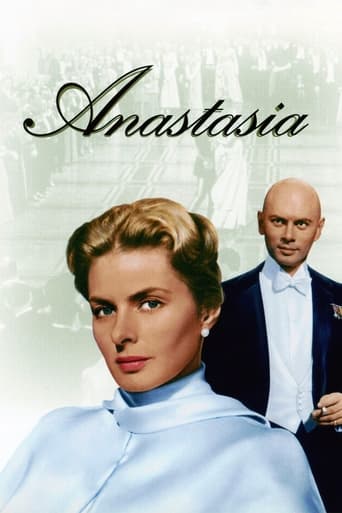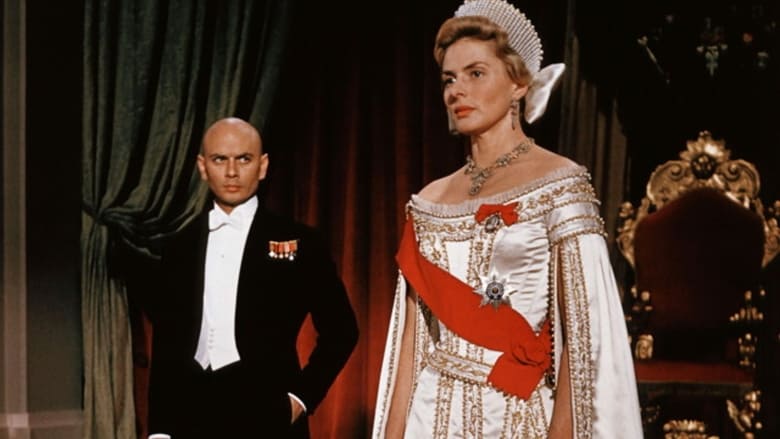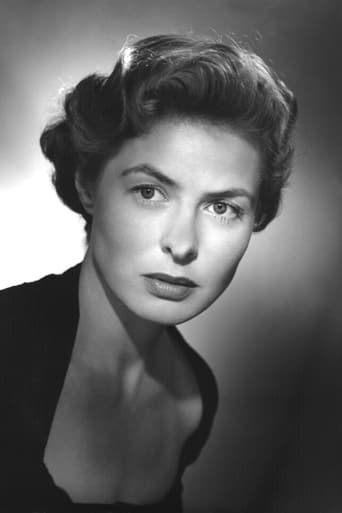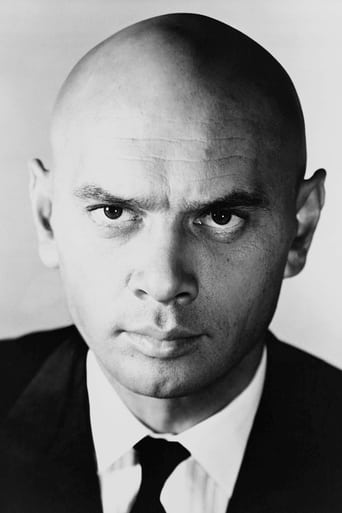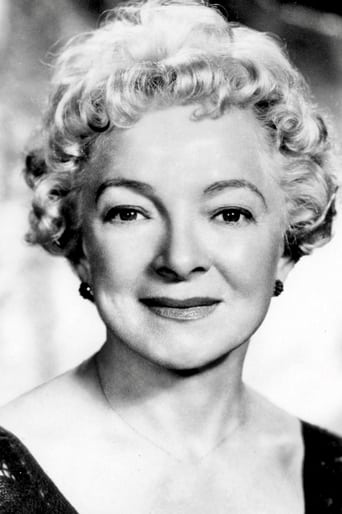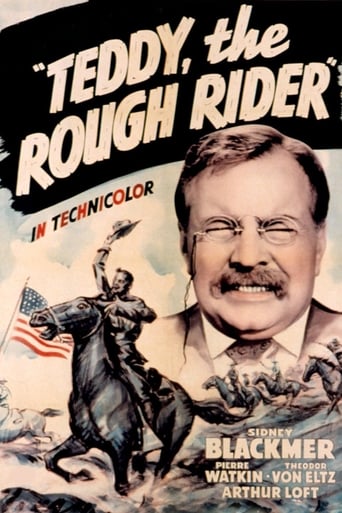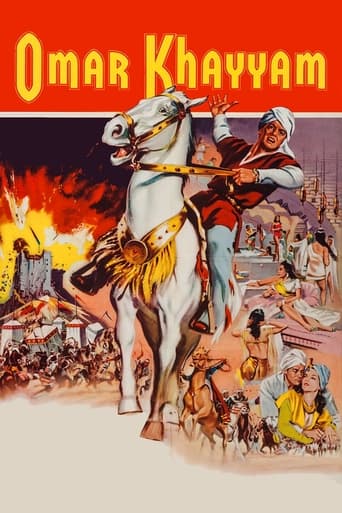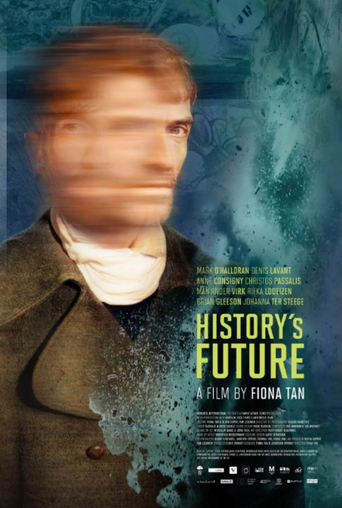Anastasia (1956)
Russian exiles in Paris plot to collect ten million pounds from the Bank of England by grooming a destitute, suicidal girl to pose as heir to the Russian throne. While Bounin is coaching her, he comes to believe that she is really Anastasia. In the end, the Empress must decide her claim.
Watch Trailer
Cast


Similar titles
Reviews
Instant Favorite.
This is a must-see and one of the best documentaries - and films - of this year.
It is neither dumb nor smart enough to be fun, and spends way too much time with its boring human characters.
It's a feast for the eyes. But what really makes this dramedy work is the acting.
each occasion when you see again. because it is more than a well known story. and it is more than exploration of a hypothesis. it is a beautiful Litvak. for the wise choices for the each role. for atmosphere. and, especially, for the music. a film impressive for less a magnificent scene - the meet between Ingrid Bergman and Helen Hayes. and for the science to use Yul Brynner in inspired manner. and, sure, for the performance of Martita Hunt. it is a surprising film for its modernity. for subtle way to be a game of appearances, love, desires. and, sure, for the end. a good support for reflection. about history, people and deep purposes.
ANATASIA is a warm welcome vehicle for Ingrid Bergman, after her exile in Europe with her then- husband Roberto Rossellini, her first Hollywood feature since 1949, it won her a second Oscar.Directed by Oscar-nominated director Anatole Litvak, the story is loosely based on a historical event, in 1927, Paris, Anna Koreff (Bergman), a woman who is suffering from amnesia and distress, has a remarkable resemblance to the Grand Duchess Anastasia Nikolaevna of Russia, who is the youngest daughter of the late Tsar Nicholas II and may have miraculously survived the execution. Anna is coerced by a former Russian General Bounine (Brynner) and company, to impose Anastasia, so as to get an inheritance worth of £10 million. But to achieve that goal, Anna must get the approval from the exile Dowager Empress Marie Feodorovna (Hayes), Anastasia's paternal grandmother, who firmly believes Anna is a hired hand like many others before and refuses to dredge up her wretched memories of the monarchy's abdication.Over forty then, it is quite a stretch for Bergman to carry off an allegedly 26-year-old Duchess, but Anastasia's supposedly decade-long trials and tribulations give her a free pass when she appears disheveled, jaded and frail, attempts to drown herself in the Seine. The proper transformation is where Bergman reigns supreme, her star-appeal and royal flair glamorously ignite the screen and she is so in her comfort zone to exude vulnerability while remaining the nuance of regal dignity. It is a standard performance out of her competence, its Oscar reward is an over-achievement.Brynner has a banner year in 1956, a one-two-three punch with THE KING AND I, THE TEN COMMANDMENTS and this one, his blunt-talking eloquence and stern countenance mingled with an unspecifiable accent, are competent for a business-orientated mind, but the growing romance between Bounine and Anna, it is too understated to detect. And Helen Hayes, the picture is also a grandiose showcase for the First Lady of the American Theatre, her conversion from steely negation to emotional capitulation is so cliché but her sterling acting is abounding in pathos and reverberations, and upstages everyone else in the cast. Also, Martita Hunt is a flamboyant hoot as Baroness Elena von Livenbaum, the first lady-in-waiting of empress."The party is over, go home!" Empress Marie's imperious remark concluded this identity- discovering mystery with an anti-climatic finish, the thematic revelation (as corny as it is) of falling in love with a person as she is, sounds like a wishful thinking and feels as vague as the true identification of Anna Koreff, which the film cautiously toys with.A typical Hollywood excesses on the production scale, where all the sophistication yields to a simplified open-face romance, ANASTASIA is beguilingly banal and banally beguiling.
What a wonderful movie!!!! They simply don't make them like this anymore. Start with the most mundane matters, the production values. The glorious wide screen aspect ratio is a delight, as is the wonderful Technicolor process, which gives us a vividness that is sorely lacking from movies nowadays. The great Alfred Newman wrote the score. Then consider the acting - first rate on all fronts. Yul Brynner and Ingrid Bergmann play beautifully off each other, and Akim Tamiroff shines in the type of role he excelled in, the sweaty, seedy, slightly comic con artist. Martita Hunt is wonderful as the slightly loony lady in waiting. Helen Hayes is off the charts as the Empress Dowager, in what was evidently a comeback role for her. To watch her display her ambivalent emotions as she deals with what could be her long-lost granddaughter are a revelation. Finally, the script; it impishly refuses to engage the central question - was Anna Anderson really Anastasia, or an impostor? By the end, the question doesn't seem to matter, so beautifully has the script dealt with things like lost hopes, wishful thinking, doubt, deceit, treachery, nostalgia for a lost world, romance, and amnesia. Don't miss this great story, beautifully told in a lavish production.
"Anastasia" is not a film for everyone. Those who insist on historical accuracy in films depicting real people and events would do best to stay away from the movie house altogether. "Anastasia," however, is not exactly about real people, although it does incorporate the lives of real humans and parallels with their true stories to depict a compelling "what-if" scenario and this is incredibly effective, even after DNA tests have revealed that "Anna Anderson" was definitely not Anastasia Nikolavena Romanov but instead, in all likelihood a Kashubian factory worker. (I am unaware whether she ever used the name "Anna Koreff.")As a matter of fact, those who are familiar with the real story are in for an even grander treat. We are thrown into 1928 Paris with a brief shot of this wretched madwoman at Russian Easter, lonely and rejected outside the Russian Orthodox Cathedral and on the brink of suicide, and we are definitely prepared to think of see as the impostor that "Anna Anderson" was. Yet as the film progresses, we are shown a woman quite literally without any past. Michael Thornton opined of the real "Anna Anderson," "Somewhere along the way she lost and rejected (Kashubian factory worker Franziska) Schanzkowska. She lost that person totally and accepted completely she was this new person."Ingrid Bergman's Anna Koreff, however, is not simply mentally lost: the world has lost her as well. It helps, perhaps, that Bergman is infinitely more convincing as a princess than as a vagabond, and the retrospective certitude of the falsity of "Anna Anderson"'s claim helps to disguise her limits at the beginning of the film when, like Yul Brynner's General Bounine, we are meant to doubt her identity. Bounine creates Koreff's new identity as the Grand Duchess Anastasia, and so effectively that he begins to believe in it himself. But the entirely unsolvable questions remain:Is Anna Koreff Anastasia? Does she actually believe she is Anastasia? More ominously, whoever she is, does she even truly and consciously remember?This piece carefully avoids resolving these questions. On the one hand, the speed and thoroughness with which she slides into her new role is difficult to explain and impossible to deny. On the other hand, the ending (among other things) is cleverly constructed so as to expose her assumed royal identity as a construction. This is not, of course, the real story, and in the post-1900 world, such a thorough and complete break with any sort of past anchor is next to impossible. But if it happened... this may be just how it happened."Anastasia" is above all a beautifully designed film, full of elegance and taste. Ingrid Bergman is as beautiful as the interior architecture against which she assumes her royal identity. Again, it is not a film for everyone: many will have great difficulty connecting and sympathizing with the royal circles and personalities in this tome, but those who are able to understand pre-modern, pre-liberal (c.f. human) sensibilities will love it. Helen Hayes is absolutely perfect and inspiring as the Dowager Empress Maria Feodorovna (it is plain to see how the real Empress was so beloved in her adopted Russia), and her chemistry with Bergman is incredible to behold. The only thing I can find to critique is that the script--and to some extent a steely wall between Bergman and Brynner--does not fully back up the eventual culmination of the relationship between Koreff and Bounine; the conclusion fits quite well thematically but is mildly illogical with regard to the plot. Still, this is a minor complaint, as "Anastasia" is first and foremost a film about identity, and one that will jar and confound its viewers time and again.

